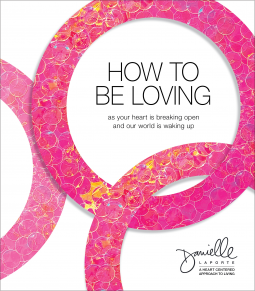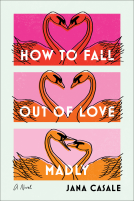
How to Be Loving
As Your Heart Is Breaking Open and Our World Is Waking Up
by Danielle LaPorte
This title was previously available on NetGalley and is now archived.
Send NetGalley books directly to your Kindle or Kindle app
1
To read on a Kindle or Kindle app, please add kindle@netgalley.com as an approved email address to receive files in your Amazon account. Click here for step-by-step instructions.
2
Also find your Kindle email address within your Amazon account, and enter it here.
Pub Date Oct 11 2022 | Archive Date Oct 11 2022
Talking about this book? Use #HowtoBeLoving #NetGalley. More hashtag tips!
Description
This is a counterculture call to gentleness, from a contemporary and accessible sage.
What happens when you begin to identify as Love––as the Soul beyond your personality constructs?
What changes when you see yourself––and others, through a Loving gaze? Everything.
Love is universal, but how we learn about it and express it is incredibly personal. Being Loving doesn’t necessarily mean feeling more. It means feeling everything with more Love. It’s the ultimate inclusiveness. Because in the heart, it’s ALL IN—your light and your shadows—and everyone else’s.
We do not need to focus on “fixing” ourselves. As we focus on living from our heart center—from Love—anything that’s not in alignment with that Light falls away. This message is so liberating. And practical.
You’ll learn that progress is more about letting go than learning new tricks. And…
• You can choose higher quality thoughts more consistently (without spiritual bypassing) and interrupt lifelong patterns of rejecting our shadow side. We can unlearn the dogma that perpetuates perfectionism.
• Your ego, which is just an exaggerated sense of a separate self, will begin to calm down. You can’t life hack your way through fear—that only creates more fear. Instead, you can invite every part of yourself into the heart to rest in Love.
• You’ll stop talking yourself out of your natural inclination to Forgive. The heart is for… giving. It’s such sweet relief to opt for the power of Love and move on.
• You repeatedly choose higher-quality thoughts. Our thinking is magnetic. We can use the intelligence of Love to calm our nervous systems and experience real peace.
• You will create conditions for healing in your life. Accepting yourself and situations as is will free up so much of your life force—energy you can use to grow in new directions.
Here it is. Heart centered, soul powered, and divinely timed. A place for nuance and Compassion, where profound acceptance has room to grow.
This is How to Be Loving.
Advance Praise
“Danielle is a force field of energy, wonder, humor, and love.” ―V (formerly Eve Ensler), author of The Vagina Monologues and In the Body of the World
“When I think of Danielle LaPorte, what comes to heart and mind is a woman who practices what she teaches. She radiates authenticity, compassion, deep caring, intelligence, and a true desire for others to transform their lives into their greater yet-to-be. She’s the real deal!” ―Dr. Michael Bernard Beckwith, founder of Agape International Spiritual Center, author of Life Visioning
“Danielle LaPorte is a bright light in the modern priestesshood. She keeps it spiritual, she keeps it real, she keeps it good.” ―Marianne Williamson, New York Times bestselling author of A Return to Love
“Our souls are yearning for Danielle’s liberating message―that discernment is crucial to our true spiritual freedom. She’s as compassionate as she is fiery, and every contemporary seeker will see themselves in her . . .” ―Shefali Tsabary, PhD, New York Times bestselling author of The Awakened Family
“Danielle is . . . a woman who’s made a tremendous impact on my life with her brave and badass approach to living a heart centered life.” ―LeAnn Rimes, singer/songwriter, host of the Wholly Human podcast
“Danielle is the living embodiment of heart centered leadership. Her approach to her life and her offerings ooze love and generosity and show us how we can live and give full out.” ―John Wineland, founder of The New Men’s Work Project, author of From the Core
“Danielle is a real-deal, no-BS teacher with an incredible depth of wisdom. She’s built a timeless library of content. Her content is unique and highly relevant, and her style of delivery makes it so lovely to consume. Danielle leads with both her heart and super intelligent mind. Her words are medicine; her body of work is life changing.” ―Christine Hassler, master life coach, author of Expectation Hangover
“Danielle LaPorte never disappoints as this generation’s go-to truth-teller and visionary, always leading by being ahead of the curve. She intuits what is needed and provides it at the exact right moment.” ―Terri Cole, psychotherapist, author of Boundary Boss
“Danielle’s voice is medicine for self-help fatigue and ambition overdrive. Her deep clarity and realness are a healing combination―and it’s right on time for our culture.” ―Mark Hyman, MD, ten-time New York Times bestselling author
“A beacon of compassion, Danielle is an extraordinary human. A woman devoted to helping people transcend their limitations, and access their potential, and truly self-actualize. Honest, accessible, and authentic to the core.” ―Rich Roll, host of The Rich Roll Podcast, vegan activist, athlete
Available Editions
| EDITION | Other Format |
| ISBN | 9781683647621 |
| PRICE | $26.99 (USD) |
| PAGES | 320 |
Featured Reviews
 Avory F, Reviewer
Avory F, Reviewer
How to Be Loving is a series of offerings by Danielle LaPorte that includes a book, companion journal, and card deck. I chose to review the book and journal, and I have to be honest—it was a bit of a slog. However, I do think LaPorte’s work will speak to a particular audience, and perhaps even be profoundly healing for the right person. I wouldn’t describe the book as the best out there on compassion and love in a spiritual sense, but it may bring some of these ideas to an audience who needs to hear them. In that sense, it’s a decent introduction.
I first encountered LaPorte through her earlier book, the Desire Map, which introduces the concept of “core desired feelings” as an alternative to goals. I still use this tool today, so I was intrigued by the positioning of this book as a next step or an even more evolved perspective. LaPorte describes coming to the theme of love through a shift from “what do I want to feel?” to “what do I want to embody?” As emotions are rather ephemeral and difficult to control, she transitioned into a focus on embodying love, which she places at the center of spirituality—a view I very much share.
However, there’s also a certain vagueness in her approach to spirituality. I was unsettled by the use of New Age tropes (e.g. capitalizing random words like Love or Divine) and by how she presents things as simple metaphysical fact that are in fact culturally relative, from her understanding of how the divine is structured to a misstatement that “most energy practices” use the chakra system (while bodily energy centers are a common understanding, chakras in particular come from various Hindu lineages, and she describes a version of those systems popularized in the US).
LaPorte’s language can be a bit Instagrammy, and though she gives nods to anti-capitalism and feminism, she’s also carefully apolitical. She talks an awful lot about Love and Light, and the fact that she has to explain several times that she doesn’t intend to advocate spiritual bypassing makes me wonder why she didn’t simply shift some of the language. While her teachings themselves aren’t generally harmful, it’s important to acknowledge that similar ideas are used in harmful ways, and the beginning reader could use a little more guidance.
Her insights are most relevant to an individual healing context, blending philosophizing on what it means to be loving with suggested practices to cultivate a more loving life. A lot of the content focuses on letting hurts go, cultivating compassion, and connecting with divine in a blend of psychological technique, generalized application of wisdom traditions, and a sprinkling of New Age language. Interpersonal relationships and collective action are mentioned offhand, but aren’t really the focus.
Given the book’s relatively short length and the casual language, I was surprised by how slow-going it was for me! While some sentences struck me as worth a pull quote, at times it was a little like reading a bunch of catchy phrases all smushed together. It was certainly not the worst case of this I’ve seen in a spiritual book, and at times it does feel like a profound point is building, but there’s not really time taken to persuade a reader or fully lay out the nuances of a theme. I found myself frequently thinking “oh yeah, that’s a really important insight… I’m glad I have direct experience or study outside this book so that I really understand it!” A lot of chapters are packed in and yet despite this broad coverage, the language sometimes feels repetitive.
LaPorte’s style is direct and conversational, addressing the reader with advice for what to do and what not to do. She includes some little examples from her life, but not a lot of in-depth storytelling. I think this may have been part of my struggle, as an associative thinker—I was missing the emotional resonance I get from a good story, and could’ve used more metaphors to ground the ideas. LaPorte relies instead on hypothetical examples that assume the reader’s context, and these will apply best to 20-something women who are at least to some extent active participants in mainstream culture and perhaps have a history with more toxic forms of spirituality.
While real world systemic issues are mentioned several times, I would’ve like to have seen more substantive inclusion of these challenges in the context of recommended practices. LaPorte frequently states the heart is naturally inclusive and that the goal is truly universal love, but by focusing purely on individual practices we miss out on how to apply such an approach when resources are scarce and members of a community are experiencing systemic oppression.
Don’t get me wrong—I do think a lot of the insights in this book are important for a specific audience! The content itself also has a broader appeal, but the presentation of it may be tough to get past. I think if I had read this book any earlier, I would’ve dropped pretty quickly into judgment of LaPorte’s lifestyle and privilege. Folks who’ve experienced major marginalization may find parts offensive or just irrelevant.
LaPorte’s take on spirituality is heavy on personal responsibility in a way that won’t make as much sense for those whose cultures and lives are more communal, and some of her guidance just wouldn’t resonate outside of her own cultural context. For example an admonition to avoid re-hashing our old stories makes a lot of sense in a psychological context, but in cultures that prioritize talking story as a mode of relationship, a different approach might be warranted.
I’ll assume best intentions here, but nonetheless there are some yellow flags, particularly in how LaPorte suggests accepting abusive behavior in our lives and focusing on unconditional love, without a strong suggestion to also set boundaries and create space. LaPorte describes boundaries as a developmental stage on the path to acceptance, which could be quite alarming in some contexts. The reader may be able to discern proper application, but I still get nervous when I read about, for example, a societal responsibility to become “un-triggerable.” Certainly releasing attachment can be healthy, but what of collective responsibility to stop perpetrating harm?
I also wish there had been a little more introduction to LaPorte’s own spiritual context, or perhaps some in-depth interviews with spiritual advisors. While LaPorte’s advice comes across as a peer who’s recently realized “oh! This is the thing!” and I didn’t find that style to work well without strongly compelling stories to ground the information and build trust. She presents a structure for the nature of divinity that not all readers will want to take on faith, without much contextualization of how she sees things.
LaPorte does blend in a ton of quotes from spiritual teachers and explains concepts from different traditions, but you’ll need to have your own familiarity of the context of these traditions (and do your own follow-up research, of course, since LaPorte herself is explaining and simplifying them from an outside lens). It’s worth noting some of the folks she does quote are popular guru-type teachers who may not be everyone’s cup of tea, and the specificity of religious teachings is absent from her quick summaries.
All of this said, most of the core concepts, if I take the most generous interpretation, are solid pieces of guidance. LaPorte blends a lot of important bits of wisdom around working with the ego and the heart, releasing attachment to the stories around our pain, and reclaiming personal power. She speaks directly to the way personal development, healing journeys, and a social justice focus can turn into their own forms of self-harm in a way that I found somewhat relatable despite our very different approaches to spirituality.
I worry that some of what she says could easily be co-opted into spiritual bypassing, but the writing itself speaks to the very real need for a more loving approach to justice. I disagree that struggle itself is a problem, and would argue that a loving struggle is absolutely possible, but if you read this book next to authors like Resmaa Menakem and adrienne maree brown, you’ll see some resonance between her approach and their treatments of “dirty pain” and cancel culture, respectively. LaPorte’s take could be especially useful for those struggling with a lot of fear, self-judgment, and anger.
I find especially useful the deceptively simple concept of identifying and working with an “antidote” to whatever brings you pain and struggle as a practice in counterbalancing (for example, rest if you’re feeling overworked). I also appreciated the chapter on “Tools for Heart Centering” and how it presents quite a few different practices such as prayer, contemplation, mindfulness, and stillness that you can weave together in simple, accessible ways.
I'm in the process of working on myself inside and out. When this book came across my screen, I knew I had to read it. I am so ready for this journey and all that it has to offer. Reading this book was an awesome experience. Always working to better myself.
Readers who liked this book also liked:
Jodi Picoult; Jennifer Finney Boylan
General Fiction (Adult), Literary Fiction, Women's Fiction
Mary Annaïse Heglar
General Fiction (Adult), Multicultural Interest, Women's Fiction









